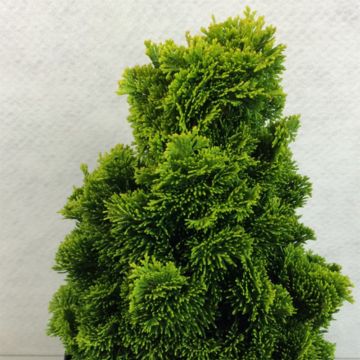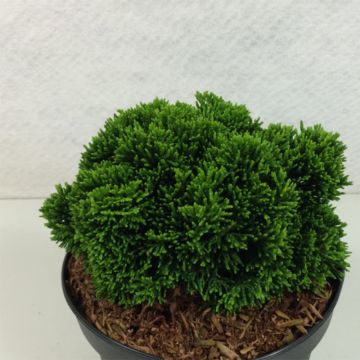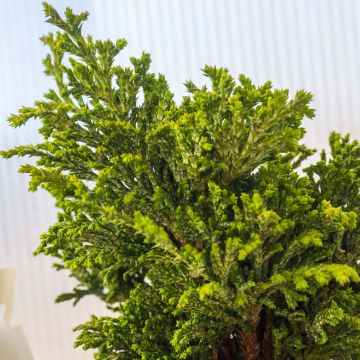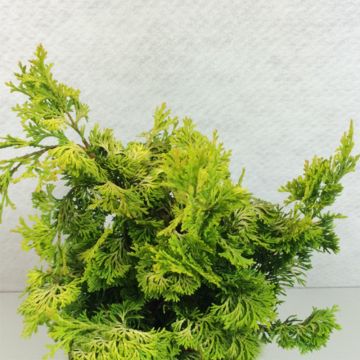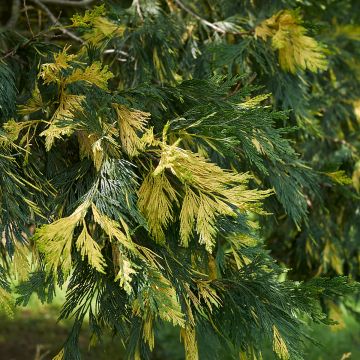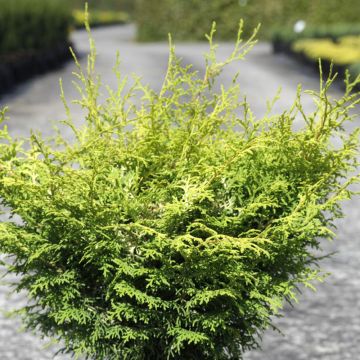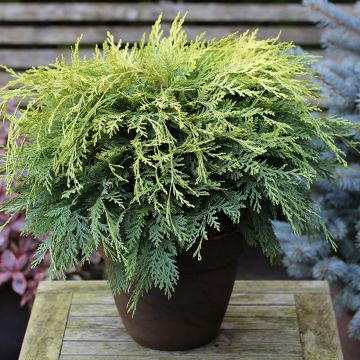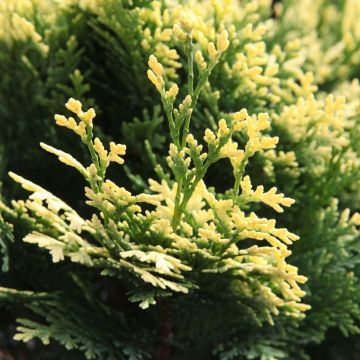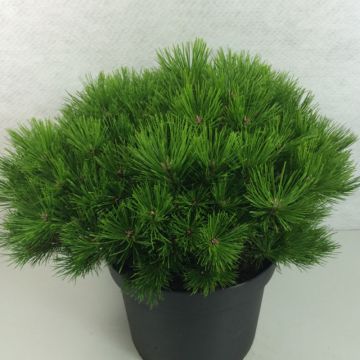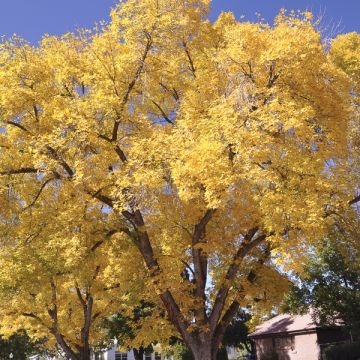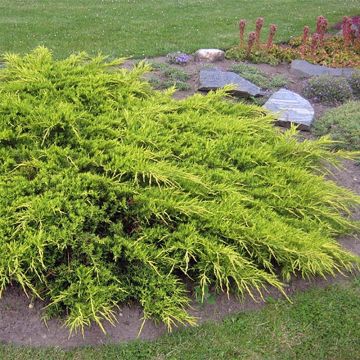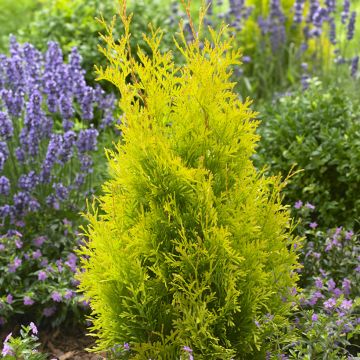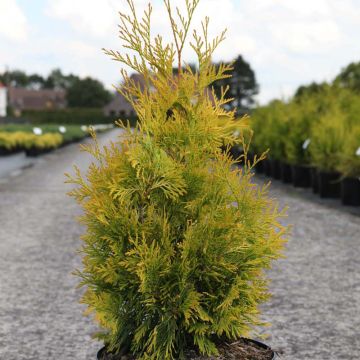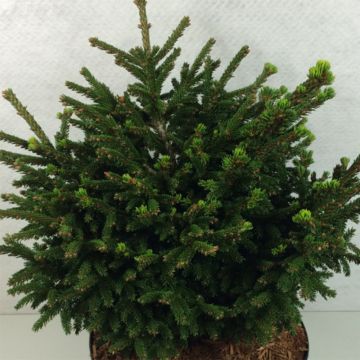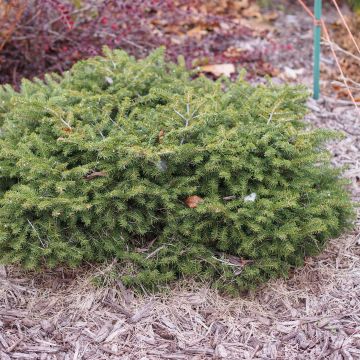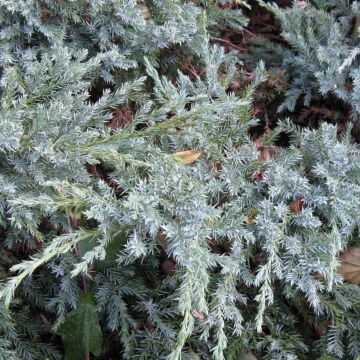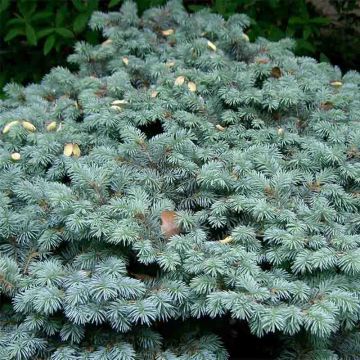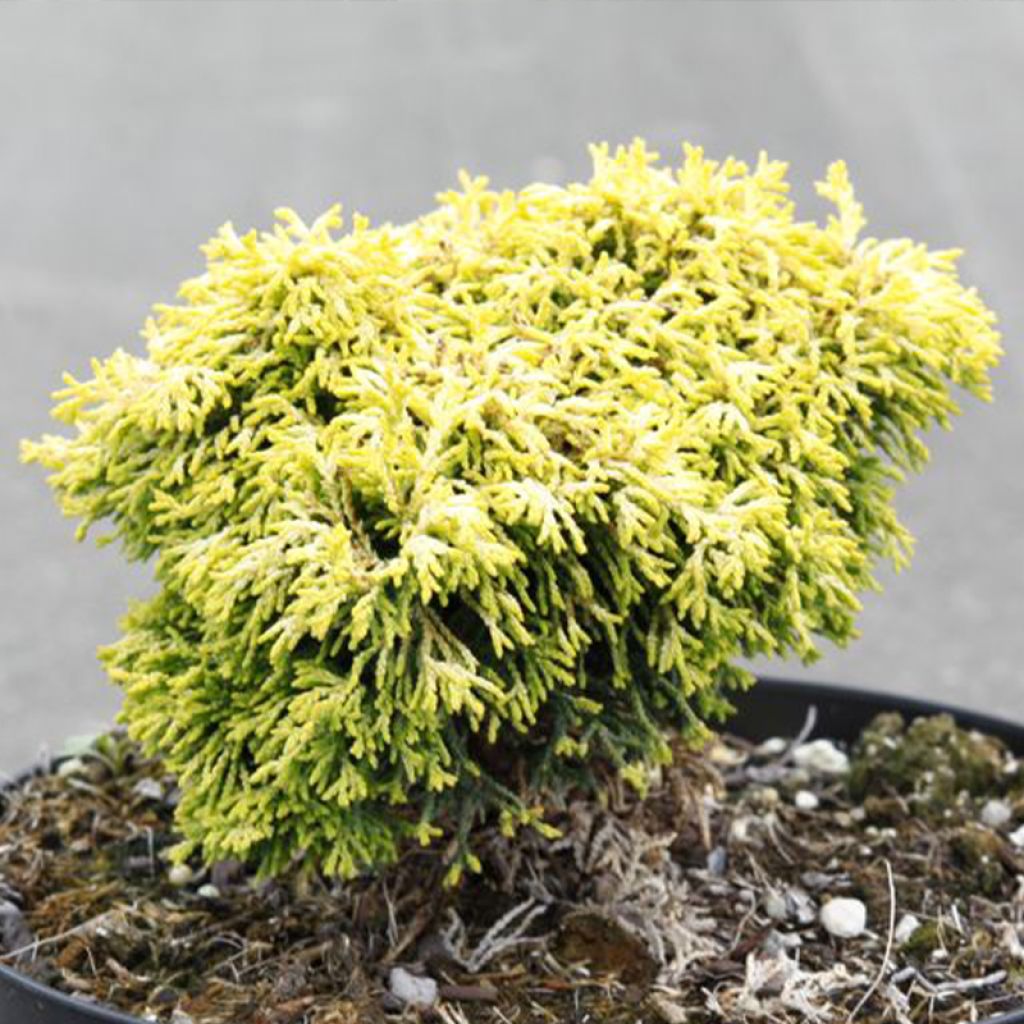

Chamaecyparis obtusa Butterball - Hinoki Cypress
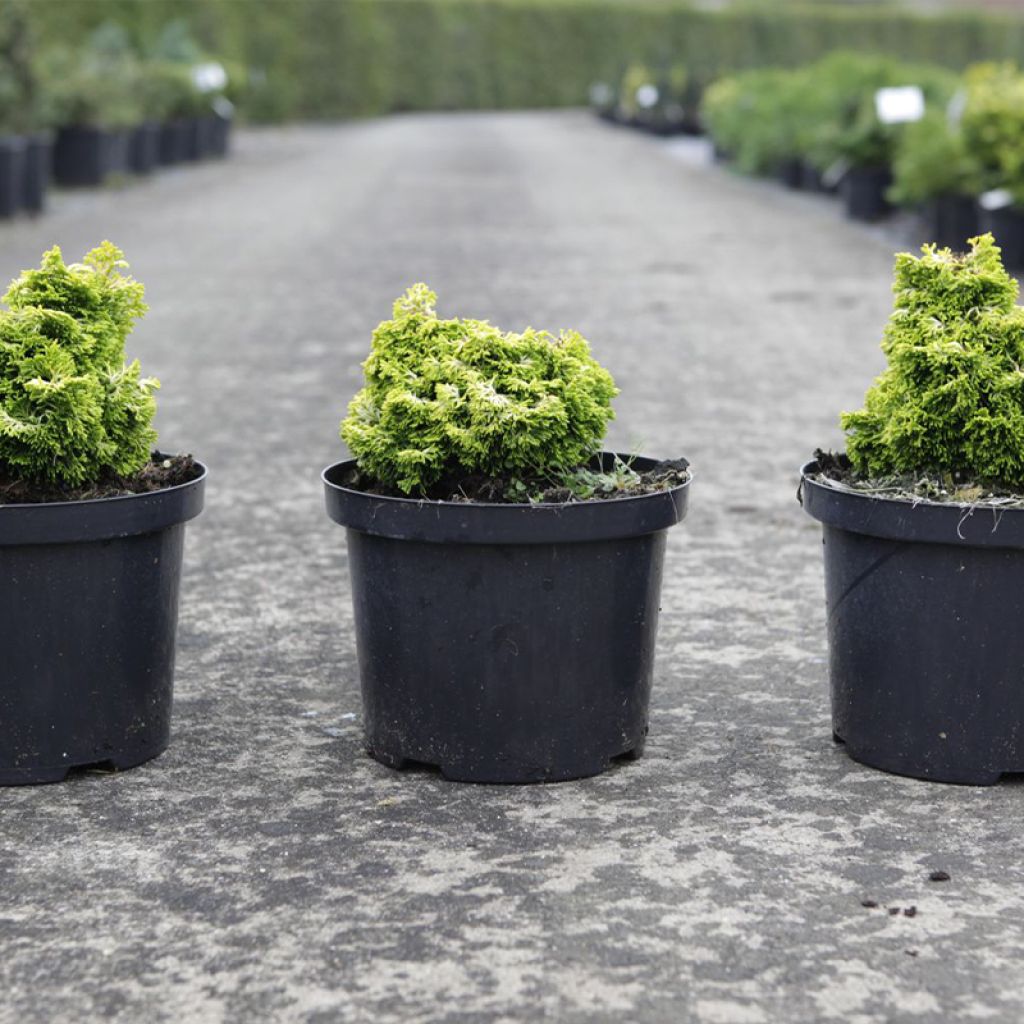

Chamaecyparis obtusa Butterball - Hinoki Cypress
Chamaecyparis obtusa Butterball - Hinoki Cypress
Chamaecyparis obtusa Butterball
Hinoki Cypress, Japanese Cypress, Hinoki False Cypress
This item cannot be shipped to the selected country
Delivery charge from €5.90
More information
Schedule delivery date,
and select date in basket
This plant carries a 24 months recovery warranty
More information
We guarantee the quality of our plants for a full growing cycle, and will replace at our expense any plant that fails to recover under normal climatic and planting conditions.
From €5.90 for pickup delivery and €6.90 for home delivery
Express home delivery from €8.90.
Does this plant fit my garden?
Set up your Plantfit profile →
Description
Chamaecyparis obtusa 'Butterball' is a dwarf conifer from the Cupressaceae family. This variety of Hinoki Cypress from Japan is remarkable for its globular and very compact habit, truly irresistible with the tousled appearance of its foliage. It has a yellow-green colour and is resistant to the heat of the sun. It generally reaches about 60cm (23.6in) in height with an equivalent width, provided you have patience, as it is one of the slowest-growing conifers! It adapts to slightly acidic to neutral soils, prefers moist and well-drained conditions, and is very cold-hardy (-20°C (-4°F) and below).
The foliage of the Hinoki Cypress 'Butterball' is evergreen and highly decorative. The finely scaled leaves form short branches that radiate in all directions, giving this dwarf shrub an almost endearing appearance, like a "ball of fur" but in a vegetal version. In sunny exposures, the young shoots turn bright yellow and contrast with the older ones, which turn greener over time. The visual contrast is therefore ensured, with a golden overall appearance and a green vegetative core. This charming miniature conifer is reserved for patient people, as it only grows a few centimetres per year! At 10 years old, its size varies from 20 to 50cm (7.9 to 19.7in), and its maximum height after 20 years or more reaches 60, even 70cm (27.6in). It is therefore well suited for container cultivation, even on a small balcony, where it will brighten up the space with its beautiful yellow colour.
Its globular habit and miniature size naturally invite planting it in rockeries. In these conditions, care should be taken to leave enough space on either side for its growth and not to plant it too close to plants with excessive development. Many plants are sometimes recommended for this use, but they can become invasive after a few years, so be careful! It can be associated with other truly dwarf and slow-growing woody plants, such as Juniperus squamata 'Blue Star', whose blue foliage will contrast nicely with the yellow of this Chamaecyparis obtusa 'Butterball'.
Alternatively, you can play it safe by reserving its perimeter for ground cover perennials that won't smother it.
Hinoki is the Japanese name for Chamaecyparis obtusa and means "fire tree" because it was once used to generate fire by rubbing the wood. The Japanese Cypress is a very important tree in Japan, where its wood has been used for the construction of numerous buildings such as temples. In addition to its economic importance for construction, an essential oil with soothing properties is extracted from it.
Report an error about the product description
Chamaecyparis obtusa Butterball - Hinoki Cypress in pictures
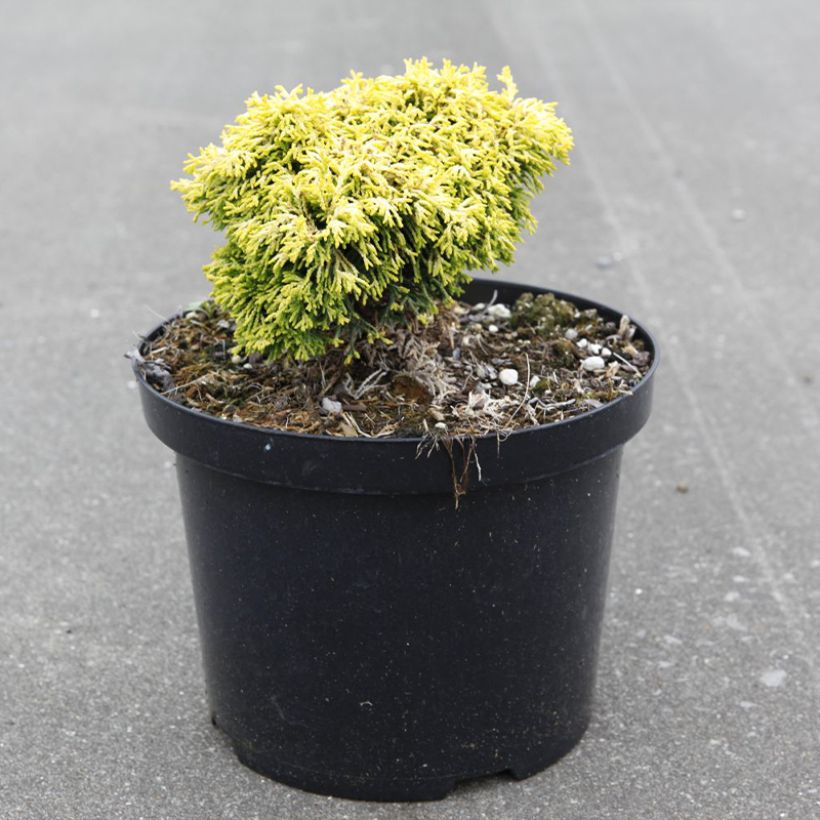

Plant habit
Foliage
Botanical data
Chamaecyparis
obtusa
Butterball
Cupressaceae
Hinoki Cypress, Japanese Cypress, Hinoki False Cypress
Cultivar or hybrid
Other Chamaecyparis
Planting and care
Plant in neutral to acidic soil, keeping it slightly moist in summer, but well-drained in winter. If your soil is sandy, it will be necessary to enrich it with compost to improve water retention and supplement with regular watering in summer.
In slightly heavy soil, it will be necessary to incorporate non-chalky gravel at the bottom of the hole to improve drainage and avoid water stagnation in winter.
Planting is best done in autumn, but it is also possible in spring, watering in the following months.
Either way, it is important to avoid the soil drying out and therefore water during hot periods without rain.
If Chamaecyparis obtusa 'Butterball' is planted in a container on a balcony or terrace, it will be necessary to choose a slightly acidic planting soil (pH 6 to 6.5) and
water it regularly throughout the growing season.
It is a bush that is not very susceptible to diseases, and pruning is completely unnecessary due to its extremely slow growth.
Planting period
Intended location
Care
This item has not been reviewed yet - be the first to leave a review about it.
Conifers
Haven't found what you were looking for?
Hardiness is the lowest winter temperature a plant can endure without suffering serious damage or even dying. However, hardiness is affected by location (a sheltered area, such as a patio), protection (winter cover) and soil type (hardiness is improved by well-drained soil).

Photo Sharing Terms & Conditions
In order to encourage gardeners to interact and share their experiences, Promesse de fleurs offers various media enabling content to be uploaded onto its Site - in particular via the ‘Photo sharing’ module.
The User agrees to refrain from:
- Posting any content that is illegal, prejudicial, insulting, racist, inciteful to hatred, revisionist, contrary to public decency, that infringes on privacy or on the privacy rights of third parties, in particular the publicity rights of persons and goods, intellectual property rights, or the right to privacy.
- Submitting content on behalf of a third party;
- Impersonate the identity of a third party and/or publish any personal information about a third party;
In general, the User undertakes to refrain from any unethical behaviour.
All Content (in particular text, comments, files, images, photos, videos, creative works, etc.), which may be subject to property or intellectual property rights, image or other private rights, shall remain the property of the User, subject to the limited rights granted by the terms of the licence granted by Promesse de fleurs as stated below. Users are at liberty to publish or not to publish such Content on the Site, notably via the ‘Photo Sharing’ facility, and accept that this Content shall be made public and freely accessible, notably on the Internet.
Users further acknowledge, undertake to have ,and guarantee that they hold all necessary rights and permissions to publish such material on the Site, in particular with regard to the legislation in force pertaining to any privacy, property, intellectual property, image, or contractual rights, or rights of any other nature. By publishing such Content on the Site, Users acknowledge accepting full liability as publishers of the Content within the meaning of the law, and grant Promesse de fleurs, free of charge, an inclusive, worldwide licence for the said Content for the entire duration of its publication, including all reproduction, representation, up/downloading, displaying, performing, transmission, and storage rights.
Users also grant permission for their name to be linked to the Content and accept that this link may not always be made available.
By engaging in posting material, Users consent to their Content becoming automatically accessible on the Internet, in particular on other sites and/or blogs and/or web pages of the Promesse de fleurs site, including in particular social pages and the Promesse de fleurs catalogue.
Users may secure the removal of entrusted content free of charge by issuing a simple request via our contact form.
The flowering period indicated on our website applies to countries and regions located in USDA zone 8 (France, the United Kingdom, Ireland, the Netherlands, etc.)
It will vary according to where you live:
- In zones 9 to 10 (Italy, Spain, Greece, etc.), flowering will occur about 2 to 4 weeks earlier.
- In zones 6 to 7 (Germany, Poland, Slovenia, and lower mountainous regions), flowering will be delayed by 2 to 3 weeks.
- In zone 5 (Central Europe, Scandinavia), blooming will be delayed by 3 to 5 weeks.
In temperate climates, pruning of spring-flowering shrubs (forsythia, spireas, etc.) should be done just after flowering.
Pruning of summer-flowering shrubs (Indian Lilac, Perovskia, etc.) can be done in winter or spring.
In cold regions as well as with frost-sensitive plants, avoid pruning too early when severe frosts may still occur.
The planting period indicated on our website applies to countries and regions located in USDA zone 8 (France, United Kingdom, Ireland, Netherlands).
It will vary according to where you live:
- In Mediterranean zones (Marseille, Madrid, Milan, etc.), autumn and winter are the best planting periods.
- In continental zones (Strasbourg, Munich, Vienna, etc.), delay planting by 2 to 3 weeks in spring and bring it forward by 2 to 4 weeks in autumn.
- In mountainous regions (the Alps, Pyrenees, Carpathians, etc.), it is best to plant in late spring (May-June) or late summer (August-September).
The harvesting period indicated on our website applies to countries and regions in USDA zone 8 (France, England, Ireland, the Netherlands).
In colder areas (Scandinavia, Poland, Austria...) fruit and vegetable harvests are likely to be delayed by 3-4 weeks.
In warmer areas (Italy, Spain, Greece, etc.), harvesting will probably take place earlier, depending on weather conditions.
The sowing periods indicated on our website apply to countries and regions within USDA Zone 8 (France, UK, Ireland, Netherlands).
In colder areas (Scandinavia, Poland, Austria...), delay any outdoor sowing by 3-4 weeks, or sow under glass.
In warmer climes (Italy, Spain, Greece, etc.), bring outdoor sowing forward by a few weeks.

































